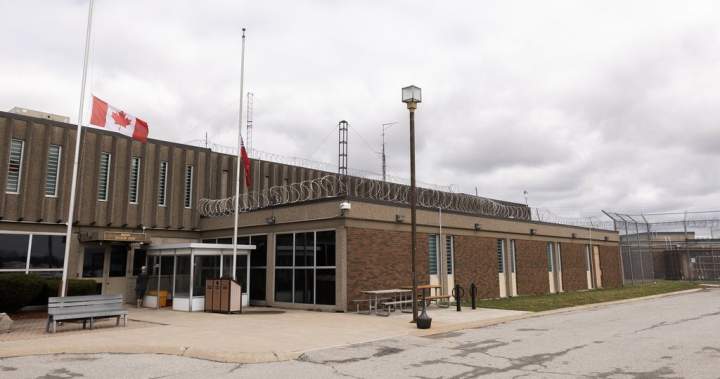Chiefs of Ontario say Ottawa acting unfairly in major projects meeting Thursday

The Chiefs of Ontario say Ottawa is levelling an unfair playing field for chiefs in a meeting planned with Prime Minister Mark Carney on Thursday to discuss the government’s controversial major projects legislation.
Carney promised in June that he would meet with First Nations after chiefs said their rights were not respected by the rush to push the bill through Parliament.
Bill C-5, the Building Canada Act, allows cabinet to quickly grant federal approvals for big industrial projects like mines, ports and pipelines by sidestepping existing laws.
An email was sent to chiefs on July 9 opening up registration for the meeting and the Chiefs of Ontario said it was initially able to register chiefs as well as legal advisers, technical and support staff to attend.
But a followup email a few days later confirmed the regional chief’s registration but denied the registration requests for all others.
“It’s disappointing that technical staff, experts and lawyers from organizations and First Nations who were going to attend this meeting were uninvited after they were allowed to register. They all spent money on travel and accommodations to support chiefs during this critical discussion,” the group representing 133 chiefs in the province said in a statement.

Get breaking National news
For news impacting Canada and around the world, sign up for breaking news alerts delivered directly to you when they happen.
“This legislation has the potential to fundamentally change this country and it’s unrealistic and unfair that the government has technical staff and lawyers in the room, but chiefs will not have that support.”
The organization said it spent tens of thousands of dollars on flights and hotels for staff that now won’t be allowed into the meeting.
Carney’s staff have not yet responded to a request for comment from The Canadian Press.
Ottawa asked First Nations chiefs to submit their questions in advance of the meeting through an online platform by July 16, and gave them the option to vote on which questions will be posed by their peers.
The invitation said that process will help highlight “shared priorities and bring the most pressing issues to the forefront.”
The bulk of the questions posted by Tuesday evening dealt with how the government will respect the rights of First Nations.
“How does your government reconcile Bill C-5’s goal of ‘economic efficiency’ with the constitutional duty to consult and accommodate First Nations under section 35,” reads one question, posed by Chief David Monias of Pimicikamak Cree Nation in Manitoba.
“Is economic streamlining being prioritized over constitutionally protected indigenous rights,” he continued.
On Tuesday nine First Nations in Ontario asked a court to declare as unconstitutional both Ottawa’s Bill C-5, and Bill 5 in Ontario, a similar provincial law meant to fast-track infrastructure projects. They are seeking an injunction to prevent the governments from using some of the most contentious aspects of the bills.
The communities say in the legal challenge filed in the Ontario Superior Court of Justice Tuesday that Bill C-5 and Bill 5 both represent a “clear and present danger” to the First Nations’ self-determination rights to ways of life on their territories.
— With files from Allison Jones in Toronto
© 2025 The Canadian Press


The Canadian Institute for Health Information says e-scooter injuries are on the rise across the country.
It released data Thursday saying that hospitalizations involving e-scooters for kids between five and 17 years old increased by 61 per cent from 2022-23 to 2023-24.
The agency said hospitalizations for men between 18 and 64 went up by 22 per cent in that time period and went up by 60 per cent for women.
The data shows the majority of e-scooter hospitalizations happened in Ontario, Quebec, Alberta and British Columbia.
Dr. Daniel Rosenfield, a pediatric emergency physician at SickKids Hospital in Toronto, said the number of kids and teens arriving in the emergency department with e-scooter injuries has been increasing over the last five years and some have been “catastrophic,” including one 13-year-old boy’s death in 2023.
“We see anything from minor scrapes and cuts and little lacerations that need a couple of stitches to … traumatic brain injury, internal bleeding in the chest and abdomen, open fractures that need to go to the operating room to be fixed,” he said.
Some children between four and six years old have been hurt while riding with their parents on an e-scooter, Rosenfield said, but injuries among teens riding on their own is more common.

Among cases where the information is available, 80 per cent of the riders who end up in the ER aren’t wearing helmets, he said.

Get daily National news
Get the day’s top news, political, economic, and current affairs headlines, delivered to your inbox once a day.
Rosenfield said he thinks the rise in injuries correlates to an increase in the popularity and affordability of e-scooters in recent years — together with a lack of understanding about how dangerous they can be.
“These scooters, much like everything electrified these days, have come down in price and have increased in power,” he said.
“Their acceleration and torque is tremendous. And most parents, when they’re buying these things for their kids, are completely unaware of that.”
Pamela Fuselli, president and CEO of Parachute Canada — a charity focused on injury prevention — said the laws around e-scooters vary between provinces and even municipalities.
In Ontario, riders must be at least 16 years old. But in Toronto, e-scooters are not allowed on public roads or paths. And just east of the city in Oshawa, they’re permitted under a pilot program.
But people are clearly using them even where they’re not allowed, Fuselli said.
“Even while a city may have a bylaw about this, they can regulate what’s operated in public spaces, but then that has to be enforced. They can’t really regulate what’s sold,” she said.

Fuselli said kids under 16 should not be riding e-scooters — and parents shouldn’t be buying them for children younger than that.
“They look like toys, but they really are motor vehicles,” she said.
This report by The Canadian Press was first published July 17, 2025.
Canadian Press health coverage receives support through a partnership with the Canadian Medical Association. CP is solely responsible for this content.
© 2025 The Canadian Press

Most new measles cases in Ontario over the past week were reported in a popular summer travel area.
Public Health Ontario is reporting 32 new measles cases, 19 of which are in Huron Perth.
The public health unit located west of Kitchener includes Stratford, known for its annual theatre festival, as well as Lake Huron beach spots including Clinton and Goderich.

Get weekly health news
Receive the latest medical news and health information delivered to you every Sunday.
That brings Ontario’s total case count to 2,276 since an outbreak began last fall.
Public health experts have encouraged cautious optimism on Ontario’s slowing case counts given the ebb and flow of the highly contagious infectious disease.
Alberta is also battling an outbreak, reaching 1,340 total cases since the outbreak there began in March. It surpassed the United States’ case count earlier this week.
Also this week, New Brunswick declared a measles outbreak and has reported five confirmed cases in the south-central region of the province.
© 2025 The Canadian Press

Ontario’s solicitor general says the province is adding 150 beds to three jails across the province using modular construction.
Michael Kerzner made the announcement Thursday at the Niagara Detention Centre, which will expand by 50 spaces, as will the Vanier Centre for Women in Milton, and the Cecil Facer Youth Centre in Sudbury, which is also being converted to an adult facility.

Get daily National news
Get the day’s top news, political, economic, and current affairs headlines, delivered to your inbox once a day.
Construction is expected to begin next year and cost the province more than $180 million.
The announcement comes not long after the province’s ombudsman raised concerns about an overcrowding “crisis” in Ontario’s correctional facilities, saying some are operating at more than 150 per cent of their capacity, compromising safety for inmates and staff alike.
Premier Doug Ford has also recently been pushing the federal government for stricter bail laws and urging judges and justices of the peace not to let violent, repeat offenders out on bail when they are charged with a new crime.
Provincial jails hold people accused of a crime but not out on bail, as well as those serving sentences of two years less a day, but the vast majority fit into the first category and have not been convicted.
© 2025 The Canadian Press
-

 Uncategorized1 month ago
Uncategorized1 month agoShop Proud, Eat Proud, Be Proud — Ottawa Canada Day Market This June 28th
-

 1 month ago
1 month agoCanada’s world junior trial saw juries tossed, intense testimony. Here’s a recap
-

 1 month ago
1 month agoMeasles circulating in northeastern B.C. community, health officials warn
-

 1 month ago
1 month agoAnishinabek Nation chief says he briefed Ontario police on protests against Bill 5
-

 1 month ago
1 month agoRing of Fire road to bring prosperity to First Nation, problems for caribou: report
-

 1 month ago
1 month agoJagmeet Singh apologizes for attending Kendrick Lamar concert after Drake calls him out
-

 1 month ago
1 month agoFormer major leaguer, Jays doctor Ron Taylor dies
-

 1 month ago
1 month agoDreaming of a lakeside cottage but can’t afford it? Co-ownership could open that door






